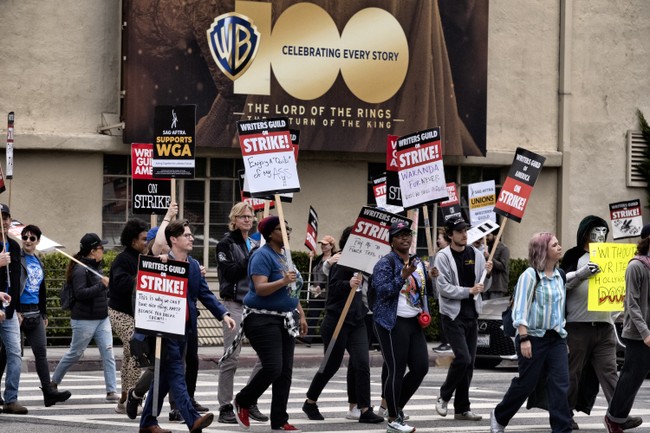After nearly five months of a work stoppage and a rather intense series of days of negotiations this past week there is a glimmer of hope that an end could be seen to the ongoing strike by the Writers Guild of America. It has been a bit of a historic summer in Hollywood in that there has been the extremely rare occurrence of parallel strikes taking place, with the actors union also holding its own work stoppage.
The most notable aspect of all of this non-melodrama, as it were, has been the relative disinterest of the general public. While the Hollywood trade papers have been awash with daily coverage of the strike while promoting various projects the writers and performers might have been involved in, you heard little of a discussion from the customer base. One saw very little on social media from people with concerns over this walkout or lending much support for either side.
Last week serious talks between the WGA reps and those representing the studios took place for the first time in a month. Previously, the meetings managed to produce little more than animosity from either side. When the last discussion of holding serious talks took place, the two sides bickered over which of the other would be made to be the first to come forward with proposals. Often, the post-meeting pressers from the representatives were filled with complaints about how the other side behaved.
This week brought some notable changes, including the top executives from major studios getting directly involved. Bob Iger (Disney), David Zaslav (Discovery-Warner), Ted Sarandos (Netflix), and Donna Langley (NBC-Universal) were participants this week. The press conferences following Wednesday’s talks were more professional, and just the fact they were willing to come back to the table the next day was seen as a positive sign.
One reason this strike has lingered since May 2 is that there was far more than just pay increases to be addressed. Streaming has led to a number of issues the WGA focused upon, such as a need to be more transparent with viewing statistics and the payment of royalties of titles in the libraries of platforms. This reality has led to streaming services purging lightly watched titles at a faster clip to sidestep paying out for content that is not generating viewers.

The studios however were not so easily capitulating as they are facing some harsh realities of their own, with streaming being a contributor. The mass migration of viewers from traditional networks to streaming presents a serious self-created challenge; cord-cutting has led to the demise of broadcast ratings, yet streaming services have not proved to be profitable for most platforms as of yet. As advertising revenue has shrunk considerably there has not been commensurate revenue from subscriptions.
The last sticking points coming into this week have been regarding artificial intelligence, haggling over pay increases, and the staffing of writers’ rooms. AI has been seen as an inherent threat to jobs (both for the WGA and the actors union). The amount of jobs required on projects is a curious demand from the writers. The guild claims that this is needed because streaming services have truncated the number of episodes in seasons for their original television series. Traditionally a broadcast series would have a season comprised of around two dozen episodes, but streamers have been delivering less than half that number. The WGA is looking to create a minimum number of writers required as compensation for this loss of work.
The timetable for an agreement to be reached was probably due to needs growing on both sides of the negotiating table. Writers going without income for months have been struggling with personal finances, and they have even lobbied to have a special bill to grant them unemployment benefits…for choosing not to work. One of the pressures the industry has been facing as a means of inspiring an agreement has been the delay in the Fall season for television. This is normally the period when new seasons are rolled out and new shows debut. Additionally, cinemas have been in a downturn, partly due to actors being prevented from promoting their films.
As positive as the news of a resolution might be for the WGA there is not going to be an immediate change in things in Hollywood. The guild leaders and lawyers are combing through the details of the proposal, and then the offer sheet needs to be submitted to both the WGA West and East Coast boards for the union members to vote. Upon approval even when getting back to work there will be time needed to generate new scripts.
And, of course, there is the small matter of needing to reach a resolution with the performers. Until then there will be little change to the Hollywood work stoppage that had little interest with the general public.



